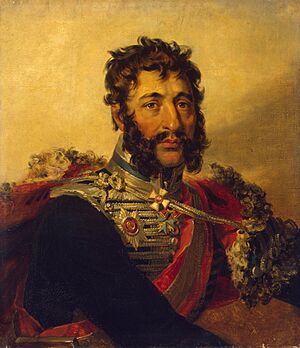Yakov Kulnev facts for kids
Quick facts for kids
Yakov Petrovich Kulnev
|
|
|---|---|

Yakov Petrovich Kulnev by George Dawe
|
|
| Native name |
Яковъ Петровичъ Кульневъ
|
| Born | 5 August 1763 Lucyn, Inflanty Voivodeship, Polish–Lithuanian Commonwealth (Present Day Ludza, Latvia) |
| Died | 1 August 1812 (aged 48) Klyastitsy, Vitebsk Governorate, Russian Empire (Present Day Belarus) |
| Allegiance | |
| Rank | Major-General |
| Battles/wars |
|
| Awards | St. George 3rd class (1808) |
Yakov Petrovich Kulnev (Russian: Я́ков Петро́вич Ку́льнев; 5 August 1763 – 1 August 1812) was a very popular Russian military leader. He lived during the time of the Napoleonic Wars. People thought of him as one of the best, alongside Pyotr Bagration and Aleksey Yermolov. Kulnev admired the famous general Suvorov. He fought in 55 battles and sadly lost his life during Napoleon's invasion of Russia.
Contents
Early Military Adventures
Kulnev's father was a Russian Cavalry officer. He came from a less wealthy noble family. His father served in the Kargopol Regiment of Dragoons. Yakov Kulnev was born in Lucyn, which is now in Latvia. His father later became the Mayor there. Yakov went to the Infantry School for Nobility in 1785.
Joining the Hussars
He joined a hussar regiment. Hussars were light cavalry soldiers, known for their fancy uniforms and bravery. Under General Suvorov's command, Kulnev fought in the Russo-Turkish War, 1787-1792. He also took part in the Polish Campaign of 1794-1795. This included important battles like Brześć and Praga (Warsaw).
Fighting Napoleon
In 1807, Kulnev was put in charge of the Hrodna hussar regiment. They were fighting against Napoleon's forces. He became well-known for his actions at the Heilsberg and Friedland. At Friedland, he famously fought his way out of being surrounded by enemy troops.
The Finnish War
In the Finnish War against Sweden, Kulnev led the first group of soldiers, called the vanguard. This group was part of General Buxhoevden's army. For his brave part in the attack on Jakobstad, he received a special golden sabre.
Kulnev's Tactics
Kulnev liked to encourage guerrilla fighting. This is a type of warfare where small groups use surprise attacks. He fought very well at Lapua, Kuortane, and Oravais. These three battles earned him the Order of Saint George and the rank of Major General. Kulnev also won a big victory at Pyhäjoki early in the war. However, he was defeated by a much larger Swedish force at Siikajoki. Denis Davydov, another famous soldier, wrote about Kulnev's brave actions in Finland in his memoirs.
Crossing the Baltic Sea
Kulnev finished the campaign with a very daring move. He led Bagration's vanguard across the frozen Baltic Sea. They marched towards the Åland Islands and then to Grisslehamn. This place was only about 70 kilometers from Stockholm, the capital of Sweden. This bold move made the Swedes want peace right away.
The Turkish Campaign
Because of his courage, Kulnev received the Order of Saint Anna of the 1st Degree. He was then asked to lead the vanguard of the Danube Army. This army was fighting against the Turks in Bulgaria.
Bold Leadership
During the Turkish Campaign of 1810, Kulnev was one of Russia's most skilled generals. His bold leadership was clear at Shumla, Nikopol, Rousse, and Batin. His actions helped the campaign move forward with more determination. However, he had a disagreement with the commander-in-chief, Nikolay Kamensky. This conflict made him leave the army for a time.
The War of 1812
After Napoleon invaded Russia in 1812, Kulnev was given an important job. He had to defend the roads that led to the capital city, Saint Petersburg. On July 3, his group of soldiers captured a French general and 200 cavalrymen.
The Battle of Klyastitsy
On July 18, Kulnev led 5,000 cavalrymen. They were the vanguard of Wittgenstein's army corps. They fought against Marshal Oudinot in the Battle of Klyastitsy. Kulnev's forces captured 900 enemy soldiers. Then, Kulnev crossed the Drissa River and met a large group of French soldiers. The Russians came under heavy cannon fire. Kulnev was hit in the legs by a cannonball and lost both his legs. He died from his wounds from this battle.
Remembering Kulnev
Yakov Kulnev did not live to fight in famous battles like the Battle of Borodino. But he was remembered as a strong, brave, and sometimes hot-tempered fighter. In 1830, a monument was built where he died. It had a special poem by Zhukovsky written on it. In 1909, a hussar regiment was named after him. He died just five days before his 49th birthday.
A Hero's Legacy
Kulnev was seen as a typical "Romantic hero" of the Napoleonic Wars. He freed his serfs, who were like servants tied to the land. People said he lived simply, almost in poverty. He wanted to be like the ancient Roman soldiers he admired. Some people think that Dubrovsky, a character in Pushkin's novel, was based on Kulnev. The book describes Dubrovsky as "a dark, swarthy 35-year-old, with a moustache and a beard, a genuine portrait of Kulnev."
The Russian general is also the subject of a poem called Kulneff (1848). It was written by Runeberg and is part of The Tales of Ensign Stål:
The Russian host could vaunt the name Of many a seasoned veteran Recorded on the scroll of fame Before our war began. Barclay, Kamensky, Bagration, Were household names to every son of Finland. When they hove in sight, We could expect a fight.
But Kulnev's name was new to all Before the flame of war was blown And he came rushing like a squall, Scarce dreamed of before known. He struck like lightning from the blue So terrible and yet so new, But ne'er to be forgot, we felt, From the first blow he dealt.
English translation by Charles Wharton Stork
 | Calvin Brent |
 | Walter T. Bailey |
 | Martha Cassell Thompson |
 | Alberta Jeannette Cassell |


